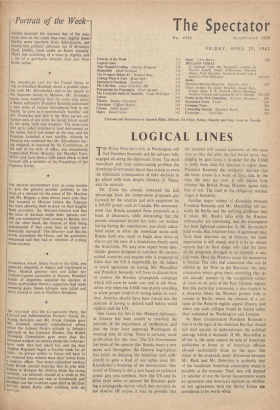LOGICAL LINES
Fr HE Prime Minister's visit to Washington will I find President Kennedy and his advisers fully engaged all along the diplomatic front. The most immediate and most embarrassing problem the American Government has to face is how to avert. the diplomatic consequences of their decision to go ahead with tests despite Geneva, U Thant, and the neutrals.
Mr. Zorin has already extracted the full advantage from the compromise proposals put forward by the neutrals and now supported by a NATO power such as Canada. His announce- ment that Russia accepted those proposals as a basis of discussion, while demanding that the powers concerned should not carry out nuclear testing during the negotiations, was nicely calcu- lated either to delay the American series .until Russia itself was ready to begin once more or else to put the onus of a breakdown clearly upon the Americans. We may now expect some spec- tacular gesture designed to convince the uncom- mitted countries and anyone who is prepared to listen that the US is responsible for the failure to reach agreement on testing. Mr. Macmillan and President Kennedy will have to discuss how to counter the Russian propaganda campaign which will soon be under way and to ask them- selves why when the USSR was plainly unwilling to allow proper control of testing inside its terri- tory, America should have been forced into the position of having to defend itself before world opinion and the UN.
One reason for this is that Western diplomacy at Geneva has been unable to convince the neutrals of the importance of verification, and that the latter have suspected Washington of wanting tests all along. There is certainly som' justification for this view. The US Government has been of the opinion that Russia wants a new series and throughout the Geneva negotiations was intent on delaying the American tests suffi- ciently to gain a lead of one series since Mr. Khrushchev's breaking of the moratorium. One moral of Geneva is that a case based on technical points gets you nowhere. Now the US and its allies must strive to prevent the Russians gain- ing a propaganda victory which they certainly do not deserve. Of course, it may be possible that the neutrals will remain quiescent on this occa- sion as they did after the last Soviet series, but, judging by past form, it is easier for the USSR. to bully them than for America to cajole them.
President Kennedy has evidently decided that the latter course is a waste of time, and, by. the time the tests are over, it will matter little whether the British Prime Minister agrees with f∎im or not. The loser the obligatory nuclear wager is humanity.
Another major subject of discussion between President Kennedy and Mr. Macmillan will cer- tainly be Berlin and the outlying problems that it raises. Mr. Rusk's talks with the Russian ambassador are continuing, and the atmosphere has been lightened somewhat by Mr. Gromyko's kind words. But whatever lines of agreement may have been sketched out at Geneva, the main negotiation is still ahead, and it is by no means certain that its final shape will take the form of .the proposals divulged in so untimely a way List week. Here the Western scope for manoeuvre is limited. The only real concession that can be offered by the West to the Russians—the only concession which gives them something they do not already possess—is the recognition (either de facto or de jure) of the East German regime. But this particular concession is also implicit in a situation where the Western powers wish to remain in Berlin, where the chances of a col- lapse of the Pankow regime appear illusory, and where any such collapse would be feared rather , than welcomed by Washington and kondon.
In these circumstances President Kennedy's line is in the logic of the situation. But that should not lead anyone to underestimate the political courage which it demands. If Mr. Macmillan is all for it, the same cannot be said of American politicians at home or of American officials abroad—particularly those on the spot. The shape of the proposals under discussion between Mr. Rusk and Mr. Dobrynin is probably that of the maximum American concession which is possible, at the Moment. Their fate will depend 01 whether or not the Soviet Government wants an agreement and America's opinion' on whether or not agreements with the Soviet Union are considered to be worth while.














































 Previous page
Previous page